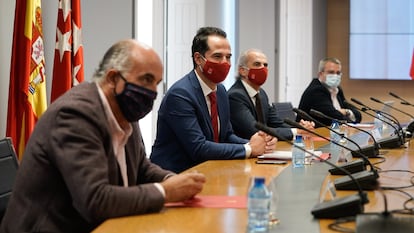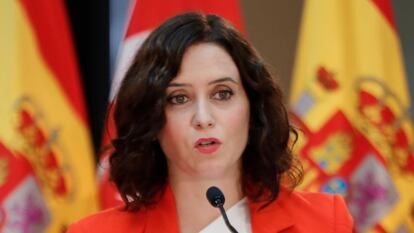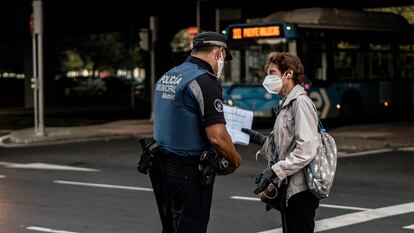Madrid, Health Ministry reach deal that could see the Spanish capital confined
The two sides have agreed that coronavirus criteria will be uniform for all cities in Spain with more than 100,000 inhabitants

A deal was reached on Tuesday evening between the Madrid region and the Spanish government, after the latter had threatened to intervene in the former given the levels of coronavirus infections that are being registered there. The Health Ministry has managed to get the regional administration of premier Isabel Díaz Ayuso, of the conservative Popular Party (PP), to accept the conditions that its experts were demanding, the most important of which will be the implementation of restrictions to all basic healthcare areas where the cumulative incidence of coronavirus infections over 14 days exceeds 500 cases per 100,000 inhabitants.
These restrictions – which involve a perimetral confinement and other restrictions on mobility – are already in place in 45 areas of the Spanish capital and the surrounding region, and the new agreement will mean the same measures will be applied to all of Madrid city and nine other major urban areas in the region. “But there is still a lot to negotiate,” said sources who were present at Tuesday’s meeting.
We cannot shut down Madrid. That would be the easiest thing to do. We have to walk the line between the economy and healthSources close to Madrid premier Isabel Díaz Ayuso
For its part, the regional government – which is run by the PP in coalition with center-right Ciudadanos (Citizens), and propped up by far-right Vox – managed to get the Health Ministry to accept that the criteria it wants to apply in Madrid will be applicable to all of Spain, and that from now on any city will be confined should it meet them. This was one of the main demands of Ayuso’s government in recent weeks, with the PP claiming that the inexistence of these criteria allowed the Spanish government – which is run by a coalition of the Socialist Party (PSOE) and junior partner Unidas Podemos – to punish Madrid for political reasons. The Health Ministry, meanwhile, argued that the major differences between regions and cities in Spain meant that it was not advisable to impose a common set of criteria, arguing a more flexible one was better because it would allow decisions to be made according to the circumstances.
The agreement was reached on Tuesday at a meeting that had been called between the Health Ministry and the Madrid authorities in a bid to end the hostilities between the two sides. Health Minister Salvador Illa spoke at the end of the meeting to announce a “coordinated public health initiative” that will have to be agreed on today by the ministry and the rest of the regions at the Inter-territorial Health Committee.

The most important point of the deal involves municipalities with more than 100,000 inhabitants in all of Spain “implementing measures to limit mobility, social contact and capacity” when three criteria are met, Illa explained. The first of these is for the cumulative incidence of coronavirus cases over 14 days to exceed 500 cases per 100,000 inhabitants. The second is for the “positivity” of PCR tests in the city to exceed 10% – i.e. the rate of coronavirus tests that are coming back positive compared to the total carried out, excluding mass testing programs. The third and final criterion is that “35% of intensive care unit beds” in a region are occupied by Covid-19 patients. At the current time, the biggest city that meets these criteria in Spain is Madrid and another nine cities from the surrounding region: Parla, Fuenlabrada, Alcobendas, Torrejón de Ardoz, Getafe, Alcorcón, Leganés, Móstoles and Alcalá de Henares.
But last night sources would not confirm whether the Spanish capital would be confined in the coming days. “We have no information in that respect,” said sources close to the Madrid mayor, José Luis Martínez Almeida, also of the PP. Since Monday of this week, a total of 45 basic healthcare areas have been subject to a perimetral confinement, which also involves the closure of parks and gardens. The Health Ministry offered no further details yesterday and pointed to today’s Inter-territorial Health Committee meeting.
The Madrid region, meanwhile, which has been fiercely opposed to the measures that the ministry wants to see implemented, continued to insist that its own approach was working. “The data is there and intervening in the region with these numbers…,” sources from the government said. Madrid registered 2,917 new infections on Tuesday and 478 Covid-19 patients in intensive care, according to its own health department.
The solution is to locate the 1% who are infecting others and let the 99% continue with their livesMadrid premier Isabel Díaz Ayuso
The current measures in the region affect nearly a million people. They are not allowed to enter or leave their areas apart from going to work, to school or university, or to a bank, among other specific reasons. Access to parks and gardens is prohibited, while businesses must close at 10pm. In the hostelry sector, capacity is limited to 50% and consumption at bar counters is not permitted. Across the entire Madrid region, private or public meetings are limited to six people apart from those who live together or in a work or institutional environment.
Tuesday’s meeting took place in the building of the deputy premier, Ignacio Aguado of Ciudadanos, and finished after two hours. The leader of the center-right party in the region has distanced himself in recent days from the public battle between the central government and the regional administration.
Some voices from within the PP have begun to suggest in private that the measures should be introduced in order to flatten the curve of infections in the region. “We are not ruling it out,” sources close to Díaz Ayuso said on Tuesday night. “But we are going to go step by step. We cannot shut down Madrid. That would be the easiest thing to do. We have to walk the line between the economy and health.”
The Madrid justice chief, Enrique López, argued yesterday that a state of alarm cannot be requested based on the reports that the regional government has at its disposal. “We are not in such serious circumstances,” he said. “Let’s forget about the word confinement.”
Meanwhile, Ayuso herself refuses to budge. “For me the solution is to locate the 1% who are infecting others and let the 99% continue with their lives,” she said on Monday. “Seniors need to be able to go out for walks. The pandemic has left a lot of people depressed. Confining is easy. We are forced to seek more creative methods.” After yesterday’s agreement, Ayuso made no comment.

The ongoing crisis in Madrid has once again drawn attention to the lack of legal means to respond to the pandemic in Spain. “There is a legal vacuum,” said Elviro Aranda, a professor of Constitutional Law at the Carlos III University in Madrid.
After the state of alarm that was in place from March to June, and that saw one of the world’s strictest lockdowns, the central government passed the control of the epidemic back to the regions. This was something that figures from opposition parties such as Ayuso had been calling for, arguing that the regional governments would do a better job of managing the health crisis. However, the situation in Madrid has worsened swiftly in September, prompting Ayuso and Aguado to do a U-turn and call on the central government to do more to assist with the situation.
Experts consulted by EL PAÍS agree that the government will have a margin to maneuver in order to take some public health measures in the region and more directly participate in the direct management of the crisis under the General Public Health Law. “If the region does not take decisions about activities, individual people or groups of people, this law allows for the central government to do so,” said Alberto López Basaguren, a professor of Constitutional Law at the University of the Basque Country.
Another option is the application of Article 155 of the Spanish Constitution, which would allow the central government to take control of a region. This was used in 2017 in response to the independence drive in Catalonia, which saw an illegal referendum on secession from Spain and subsequent unilateral declaration of independence. But this, experts agree, would be disproportionate and “difficult, if not impossible, to apply because it requires a regional government to fail to meet its obligations,” added López Basaguren.
English version by Simon Hunter.
Tu suscripción se está usando en otro dispositivo
¿Quieres añadir otro usuario a tu suscripción?
Si continúas leyendo en este dispositivo, no se podrá leer en el otro.
FlechaTu suscripción se está usando en otro dispositivo y solo puedes acceder a EL PAÍS desde un dispositivo a la vez.
Si quieres compartir tu cuenta, cambia tu suscripción a la modalidad Premium, así podrás añadir otro usuario. Cada uno accederá con su propia cuenta de email, lo que os permitirá personalizar vuestra experiencia en EL PAÍS.
¿Tienes una suscripción de empresa? Accede aquí para contratar más cuentas.
En el caso de no saber quién está usando tu cuenta, te recomendamos cambiar tu contraseña aquí.
Si decides continuar compartiendo tu cuenta, este mensaje se mostrará en tu dispositivo y en el de la otra persona que está usando tu cuenta de forma indefinida, afectando a tu experiencia de lectura. Puedes consultar aquí los términos y condiciones de la suscripción digital.








































